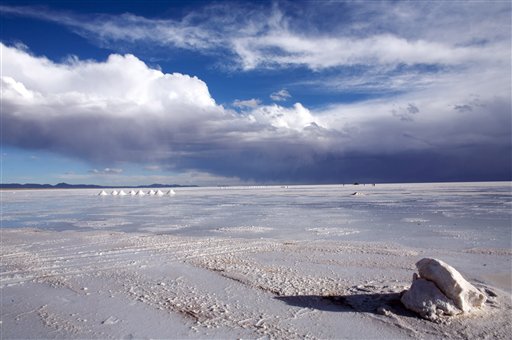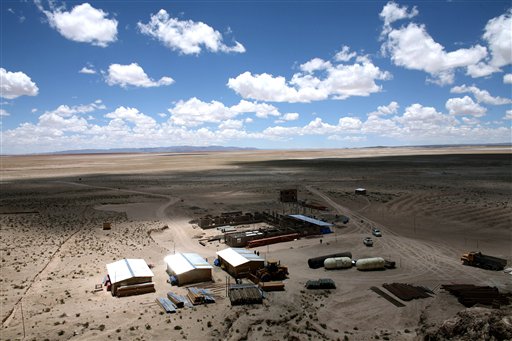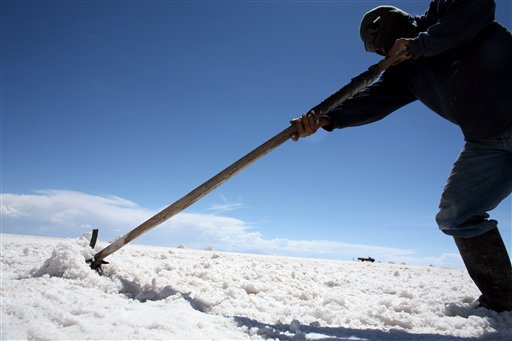
(above) Piles of salt lay on the salt flats of Uyuni, Bolivia where the population has harvested salt for years, Tuesday, Jan 27, 2009. Underneath the salt lies the world's largest lithium reserves. A showdown is brewing as multinationals are lured by the reserves but face a cold reception from the Evo Morales government known for nationalizing industry. Lithium is the key component for electronics batteries and electric car batteries. (AP Photo/Noah Friedman Rudovsky)
Bolivia pins hopes on lithium, electric vehicles
March 1, 2009 - Associated Press
By FRANK BAJAK and CARLOS VALDEZ
LA PAZ, Bolivia (AP) -- To Bolivia's president, it's the great silvery-white hope.
Lithium, the lightest metal. Half the density of water. Used in cell phone, laptop and iPod batteries, and in the years to come, many thousands of electric and hybrid vehicles propelling humanity into a cleaner energy future.
"Lithium is the hope not just for Bolivia but for all inhabitants of the planet," President Evo Morales said before meeting in Paris last month with Bollore Group, one of several companies vying to extract the metal from remote salt flats in the poor landlocked nation.
Bolivia has about half the world's proven lithium reserves, according to the U.S. Geological Survey, and Morales says he's ready to sink some $200 million into mining it.
He just needs the right partner.
In addition to Bollore, suitors include Japan's Sumitomo Corp. and Mitsubishi Corp.
But Morales is insisting on requirements that could turn them all away, leaving the remote Salar de Uyuni flats as they have been for millenia -- a vast crystalline dry sea, shimmering quietly in the fierce Andean sun.
For Bolivians, economic development and job creation are a must -- the partner can't be like foreign companies who they say shortchanged the nation's hardscrabble Indians while extracting copper, silver and tin from vegetation-starved highlands. Morales wants lithium batteries manufactured domestically, and even hopes to assemble battery-powered cars.
"We don't even manufacture a pin here," Mining Minister Freddy Beltran complained to The Associated Press. "It's a story that must change."
(below) A $6 million pilot plant for extracting lithium from the salt flats of Uyuni, in the town of Rio Grande, Bolivia is shown on Tuesday, Jan. 27, 2009. The flats are believed to hold more than half the world's reserves of lithium, the key component for electronics batteries and electric car batteries. The Evo Morales government wants to avoid letting foreign corporations earn all the profit from Bolivia's natural resources, setting the stage for a showdown over the lithium reserves. (AP Photo/Noah Friedman Rudovsky)

But Bolivia lacks the expertise to even begin to compete with Chile and Argentina, which together account for more than half the world's 27,400 metric tons of annual lithium production. China and Australia also are major producers.
Since his 2005 election, Morales has secured for Bolivians the bulk of profits from their natural gas -- South America's second-largest known deposits after Venezuela's. Now he sees lithium as a way to create an industrial economy.
"The state doesn't see ever losing sovereignty over the lithium," Morales told reporters. "Whoever wants to invest in it should be assured that the state must have control of 60 percent of the earnings."
A $6 million pilot project managed by Comibol, the state-owned mining company, plans to begin some production next year. To accelerate the process, Bolivia has asked Sumitomo, Mitsubishi and Bollore to join a "scientific committee" to determine how best to mine the flats' estimated 5.4 million tons of lithium.
"Right now, most of the lithium that is used (industrially) is drawn from South America because it is the easiest to extract," said Haresh Kamath of the Electric Power Research Institute in California.
Bolivia's economy is already dependent on mining and natural gas extraction, heavy industries whose contamination is accepted because the profits and jobs are so sorely needed in South America's poorest country. A battery plant or car factory would increase pollution, but most likely be located in an urban area with at least some infrastructure and available workers.
One possibility: El Alto, the slum around the capital that is a huge base of the socialist leader's political support.
Extracting the lithium, meanwhile, would plant a substantial human footprint in one of the world's most remote places, a 12,000 foot high desert visited only by flocks of pink flamingos and occasional tourists. The metal, found in salty water typically just a few yards below the crusty surface, would be pumped into evaporation pools and then trucked away.
Kamath said scrubbers at modern plants can contain sulfur dioxide and other byproducts of processing the lithium, which is shipped as non-hazardous lithium carbonate for use in heat-resistant glass, ceramics and anti-psychotic drugs, as well as batteries.
Marco Octavio Rivera of Bolivia's Environmental Defense League says he can't yet estimate the environmental impact, since no details of Morales' visions have emerged. But he says extracting and processing lithium in the same way that Argentina and Chile do it won't cause as much contamination as Bolivia's other mining industries.
Sumitomo supplies Toyota, which now uses nickel-metal hydride batteries in the popular Prius hybrid but plans a future lithium-battery by the end of this year and an all-electric car in 2012. Mitsubishi plans to begin producing electric cars later this year.
In the U.S., Chevrolet's Volt is to go on sale next year, powered by lithium-ion batteries supplied by LG Chem Ltd. of South Korea.
Mass production of Bollore's electric car, meanwhile, is planned in Turin, Italy, later this year. The car is designed by Pininfarina; Bollore promises 150 miles on a single charge and a top speed of 80 mph.
(below) Residents on the shores of the salt flats of Uyuni, Bolivia have survived for generations by collecting the salt and selling it across the country, in the Salar de Uyuni, Bolivia on Tuesday, Jan. 27, 2009. Now the salt flats are attracting multinationals because underneath the salt lies the world's largest lithium reserves. Lithium is the key component for electronics batteries and electric car batteries. (AP Photo/Noah Friedman Rudovsky)

The Bollore Group's financial director, Thierry Marraud, told the AP in Paris after meeting Morales that his company is preparing a detailed plan to develop Bolivia's lithium industry.
"We told him, 'For you, it's better to transform the lithium than just to export it straight,'" he said. "If President Morales wants a car plant, we can help him, Why not? It's not impossible."
Spokesman Koji Furui said Sumitomo is in preliminary talks with Bolivia, and feels its chances are good because it just purchased a silver mine concession nearby. Mitsubishi described its talks as more serious than preliminary, but offered no details.
Neither Japanese company has committed publicly to making the batteries in Bolivia, and industry analysts are skeptical.
"Some of the most carefully guarded technologies in the world today are lithium-ion and nickel-metal hydride battery technologies," said Detroit-based metals consultant Jack Lifton. "The Japanese and Koreans do not export these technologies, not even to the United States."
Battery-making is capital intensive, highly automated, produces few jobs and requires nearly the same precision as the semiconductor industry. Also, auto manufacturers generally want batteries made near their assembly plants.
How soon Bolivia's lithium deposits are developed depends on many factors -- the U.S. government's auto industry bailout, whether Chevrolet's Volt sells well at up to $40,000 a car, and whether U.S. gas prices return to $3 a gallon or more in an economic recovery, said Bill Moore, editor of the online electric-vehicle journal EVWorld.
Other analysts believe gas prices will need to go even higher if President Barack Obama's goal of 1 million plug-in hybrids vehicles on U.S. roads by 2015 is to be met.
Some demand could be spurred by part of the U.S. stimulus package -- $2.3 billion to develop U.S. battery technologies. In his speech to Congress Tuesday night, Obama complained that many such batteries are now made in South Korea.
For now, predictions of a lithium shortage and a spike in prices appear unfounded. Currently, there is a slight oversupply, and plenty of capacity to meet needs during the economic downturn.
"Everything I've been hearing from the producers and industry consultants indicates there won't be any shortage for the next 10-15 years," said Brian Jaskula, a U.S. Geological Survey commodity analyst.
Chile's top producer, SQM S.A., says it supplies a third of the global market and says it recently expanded capacity to 40,000 metric tons of lithium carbonate a year, enough to power about 5 million vehicles using current technologies.
It is relatively easy to move and refine Chile's lithium from Andean salt flats to cargo ships for transport to Asia or the United States. Improving the roads and developing other infrastructure in a remote corner of landlocked Bolivia, however, could take years. Marraud said it would take at least two years to identify the deposits and build a processing plant.
Given these difficulties, Bolivians shouldn't ask too much of foreign partners, said Juan Carlos Zuleta, a Bolivia-based metals analyst.
"The people could exaggerate their demands and that could, in the end, lead to the business going elsewhere," he said.
AP Technology Writer Frank Bajak reported from Bogota, with contributions from Jenny Barchfield in Paris, Kelly Olsen in Seoul, South Korea, and Yuri Kageyama in Tokyo